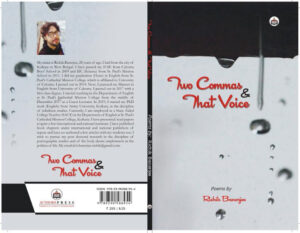Two Commas and That Voice by Richik Banerjee
Reviewed by Ghada Ibrahim
There is something about the raw form of poetry that radiates from Two Commas and That Voice by Richik Banerjee that captivates the reader. From the title to the contents, the notion that poetry stems from incompletion is vividly depicted. While mainstream or popular poetry relies on narrating a story in a coherent and concise manner, Banerjee focuses on the incompleteness almost entirely.

At first glance, his poems appear to be nothing more than a jumble of words. The reader is required to exert themselves to an extent before settling into the style of Banerjee. Once one does, the poems cradle them in a hollow embrace. I say hollow because it is in the emptiness that one finds meaning. Ironically, the poem that made the most sense to me was “A Poem.” In 12 words, Banerjee encompasses the entire essence of the book. It is important to note the exaggerated use of space.
“His poems grant every individual reader a chance to create a narrative on the basis of their own experiences, understanding, and vision of the world”
While reading the book, I was surprised by the deep sense of comfort the pages granted me. For once, the noise in my mind quietened down. In wake of the scattered words bedecking the pages, my thoughts snuggled in the space between. I was not reading a story and I was not narrating a script. My thoughts stepped into the light and filled in the gaps. It was only then that the power of Banerjee’s poetry really struck me. His poems grant every individual reader a chance to create a narrative on the basis of their own experiences, understanding, and vision of the world.
While Banerjee manages to present an interesting perspective, he falls a little short in his attempt to adequately deliver a compelling read. As far as “sandwiched voices” go, the poems definitely hit the mark. However, should one choose to amplify an otherwise muffled voice, one would need to grant it the right spotlight. In Two Commas and That Voice, I fail to see the message or even the point. In a sense, it reminds me of a bawling toddler who themselves are unaware of what it is they want. In another sense, I feel it is the correct representation of the burning world we live in. Ashes to dust to the deafening noise that engulfs us.
We do what we wish with Banerjee’s work akin to how we do what we wish with those around us. We determine the roles they play in our lives and we dictate how we treat them. We project our visions, expectations, and needs on everything around us so as to always remain the main character. Banerjee grants us the stage. We play the lead role and we pirouette center stage. And in that, the magic of his work shines through.
Banerjee does not shy away from addressing hard truths. And that grants his poetry a relentless power. It rears its head and lunges forward commanding attention. This becomes rather obvious in the style he pursues throughout the book beginning from “Tick Tick Tick Tick” in the first poem Reach For. Anaphora emerges multiple times throughout the book. It speaks to the idea of drawing the reader in and catching their attention. But “that voice” forms no words. It is a voice that inherently lacks purpose. We can hear the noise. But that is just it. It is not any more than just… noise.?
Perhaps Banerjee intended his poetry to deliver nothing more than that – to draw attention to the noise, to make people more aware. His poetry comes from a place as raw as an open wound. In that wound, we drown.
![]()

Ghada Ibrahim is a Psychology graduate from Middle East Technical University, a voracious reader, and a published writer. She likes to live with no regrets and has been blogging and writing since the age of 15. Aspiring to publish her book one day, she revels in sharing her love for all things literary with the rest of the world. Her writings have been featured in Mad in Asia Pacific and Bloomer Magazine.



